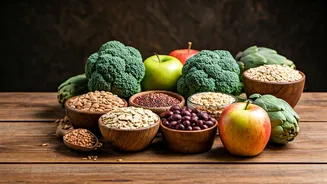Fiber's Gut Connection
The gut microbiome, an intricate ecosystem within your digestive tract, plays a pivotal role in overall health. Fiber, a type of carbohydrate that the
body can't digest, acts as the primary fuel source for beneficial gut bacteria. It aids in promoting regular bowel movements and can also decrease the risk of several chronic diseases. Fiber-rich foods enhance the diversity of the gut microbiota. Fiber is also key to preventing digestive issues such as constipation, bloating, and other related discomforts. Fiber consumption can regulate blood sugar levels and improve cholesterol levels. A Harvard-trained gastroenterologist emphasizes the importance of making fiber a priority in the diet.
Apples: Fiber Powerhouse
Apples, often praised for their convenience and taste, are also a fantastic source of fiber. A medium-sized apple with the skin on contains approximately 4.4 grams of fiber. Apples boast a type of soluble fiber called pectin, which acts as a prebiotic, nourishing the good bacteria in your gut. Pectin also helps with regulating blood sugar levels and can help lower cholesterol. The high fiber content in apples can help to improve digestion. Apples make a great snack, and are versatile, and can be enjoyed whole, sliced, or incorporated into various recipes like salads or baked goods. Eating apples with the skin on is especially beneficial as the peel contains much of the fiber.
Berries: Flavorful Fiber Boost
Berries like raspberries, strawberries, and blueberries are not only delicious but also packed with fiber. A cup of raspberries contains about 8 grams of fiber, while a cup of strawberries has around 3 grams. Blueberries have approximately 3.6 grams of fiber per cup. Besides fiber, berries provide antioxidants, and several vital vitamins. The fiber in berries helps to promote healthy digestion, prevent constipation, and supports a balanced gut microbiome. Berries are low in sugar, which makes them a beneficial option for individuals concerned about managing their blood sugar levels. They can be added to breakfast cereals, mixed in smoothies, or enjoyed as a refreshing snack on their own.
Legumes: Fiber Champions
Legumes, including beans, lentils, and peas, are known for their high fiber content. A cup of cooked lentils provides roughly 15.6 grams of fiber, making them an excellent choice for gut health. Beans and peas similarly offer significant amounts. Legumes are a source of protein and essential nutrients. They also help to control blood sugar levels, and reduce the risk of heart disease. The fiber found in legumes feeds the beneficial bacteria in the gut, which in turn leads to a healthier and more balanced gut microbiome. Legumes can be used in a variety of dishes. They're inexpensive, easy to prepare, and a sustainable source of nutrients. Adding a variety of legumes to your diet can lead to improved gut health.
Chia Seeds: Tiny Fiber Boost
Chia seeds, small but mighty, are a fiber-rich food. They are full of fiber, with about 10 grams of fiber in two tablespoons. Chia seeds are a source of omega-3 fatty acids, and essential minerals. When mixed with water, they expand, forming a gel-like consistency that aids in digestion and promotes satiety. The fiber in chia seeds feeds beneficial gut bacteria, contributing to overall gut health. Chia seeds can be easily incorporated into your diet, added to smoothies, sprinkled on yogurt or oatmeal, or used as a thickening agent in sauces. Chia seeds are also easy to consume because they are tasteless and can be added to any meal. Consuming chia seeds is a great way to boost your fiber intake, enhancing gut health, and improving digestive function.












